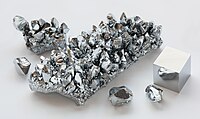
Photo from wikipedia
Brewery effluents contain complex mixtures that are discharged into rivers. Therefore, it is necessary to evaluate the genotoxic potential of these effluents. The study evaluated the genotoxicity of surface water… Click to show full abstract
Brewery effluents contain complex mixtures that are discharged into rivers. Therefore, it is necessary to evaluate the genotoxic potential of these effluents. The study evaluated the genotoxicity of surface water and sediment samples from the Jacuí River in the state of Rio Grande do Sul, Brazil, which received effluents discharged from a brewery. The Salmonella/microsome test, Comet Assay and Micronucleus test on V79 cells, as well as the element profile (PIXE) and PAHs levels were used for this purpose. The surface water and sediment samples were collected in summer at three sites: 1 km upstream from the brewery discharge site (Site A); in front of the effluent discharge site, after chemical and biological treatment (Site B); about 1 km downstream from the discharge site (Site C). Only a sediment sample from Site A induced a mutagenic effect using the Salmonella/microsoma test (TA97a). All three sites presented genotoxicity (A, B and C), both for water and sediments using comet assay, and mutagenicity in the samples from Site B (surface water) and Site A and Site C (sediments) using the micronuclei tests. The results of PIXE and PAHs showed higher levels of elements for samples obtained from sites upstream and downstream from the effluent discharge. Environmental samples consist of complex mixtures of chemicals, and it is difficult to associate DNA damage with a specific element. This study showed that brewery effluent contains metals and PAHs that can induce in vitro genotoxicity under the conditions of this study.
Journal Title: Chemosphere
Year Published: 2017
Link to full text (if available)
Share on Social Media: Sign Up to like & get
recommendations!